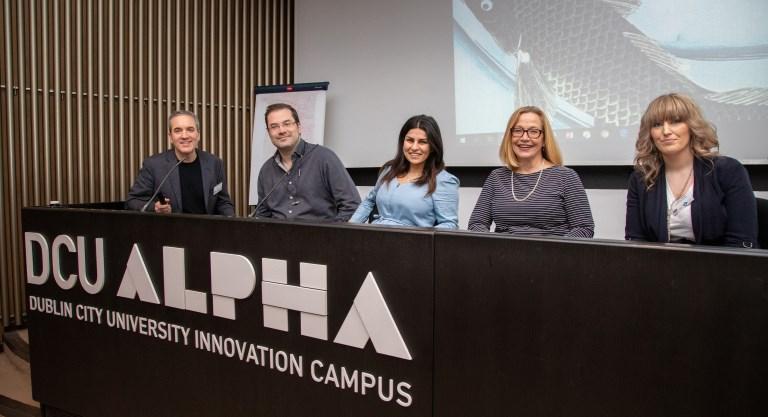

Future of Fintech, Impact of Digitalisation at DCU Alpha
The Future of Fintech, Impact of Digitalisation and Brexit event was held in DCU Alpha on March 29th with a welcome address by Dr Martin Crane and Dr Markus Helfert of ARC-SYM.
A lively and informative breakfast event kick started with a discussion on the Irish position in Fintech by Paul Ryan, Department of Finance and Public Expenditure.
Fintan Byrne of CurrencyFair focused on the impact of Brexit while the possible next steps following Brexit depending on the deal or no deal outcomes were outlined by Robert O’Reilly of Vulcan Consulting.
Other highlights included contributions from Barry McCarthy of Assure Hedge on the industry perspective on Fintech as an alternative to classical banking;Peter Oakes of Fintech Ireland updated the audience on the Fintech Ecosystem in Ireland by counties while Peter Dunne of Bank of Ireland Group concluded the morning with an overview of BoI data architecture and challenges of cultural change related to digitalisation.
A Panel discussion was led by Pete Townsend of Norio Ventures and other discussions included Coral Movasseli of Girls in Tech Inc who opened with the topic of diversity in Fintech.
Afternoon sessions included, among others, contributions from Jonathan Ryder of EY, Klaus Sonnenleiter of ELEKS on industry solutions: Blockchain for Secure Infrastructure in Financial Services while Marija Bezbradica and Markus Helfert of Fintech Fusion provided research insights on InsureTech and Paytech. Hitesh Tewari of Trinity College Dublin explained how Blockchain works and how Innovative simplified way of authentication would expand Fintech horizons. Joe McLaughlin of Deloitte reviewed details of AI in Fintech, Financial Machine Learning in a Big Data and AI age. Mark Cummins of Irish Institute for Digital Business concluded the event with IIDB, PSD2, and Open banking notes.
About Arc-Sym:
ARC-SYM addresses complex and dynamic problems in science, engineering, health and maths by developing appropriate models and testing ideas.Investigation of systems at all scales relies on knowledge of their design and operation, the relevant data, and translating this into useful information. We use our interdisciplinary expertise with DCU and national high-performance computing infrastructure to work with different academic and commercial groups to provide flexible and specific solutions in the area of research computing. This is fundamental to creating simulations and predictive analytics designed to verify, inform and develop information on complex systems.
